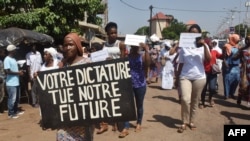Young demonstrators hurled stones and erected barricades on a major road in a suburb of the capital Conakry on Thursday as police officers and gendarmes fired tear gas to try and disperse them. Gunfire was also heard.
The West African country's ruling military junta, in power since a 2021 coup toppled former president Alpha Conde, has banned political protests, with the latest clashes reported from Wednesday evening.
The National Front for the Defense of the Constitution (FNDC), a coalition of opposition political parties and civil society groups, said six people sustained bullet wounds, with one left in a critical condition.
It said the authorities had called up army units for reinforcements. Alseny Sall, spokesman for the Guinean Organization for the Defense of Human Rights, called the decision "concerning" and said nothing could justify it "at this stage".
The FNDC had called for the rally to demand the release of three of its arrested activists and other prisoners they say are being held for political reasons as well as a return to civilian rule.
Guinea's main political parties had also encouraged people to take to the streets.
The junta led by Colonel Mamady Doumbouya has ordered the dissolution of the FNDC and pledged to restore civilian rule after implementing key reforms.
The opposition accuses the junta of grabbing power and silencing dissent by arresting political and civil society leaders and carrying out legal action.
The main political parties have refused to engage with the junta on the terms of the transition period.
The transition period was fixed at two years beginning from January this year following pressure from the regional bloc, the Economic Community of West African States, which has also had to deal with coups in Mali and Burkina Faso since 2020.




